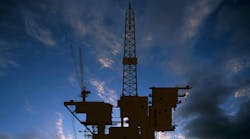US officials want the United Nations to quickly lift sanctions on Iraq and phase out an oil-for-aid program. The program would extend past its scheduled June 3 expiration, under the US proposal, but would be phased out over 4 months.
A resolution is needed soon "in order to get the Iraqi economy started again, in order to have free trade and an economic transformation, so the Iraqi people can be taking care of themselves in the future," Kim Holmes, US assistant secretary of state for international organizational affairs, told the Foreign Press Center May 12. "It's important that the situation in Iraq return to normal as quickly as possible, and we believe that lifting sanctions is a necessary part of that."
The US submitted a draft resolution, cosponsored by Spain and the UK, to the UN Security Council May 9. Holmes said it contains language that would signal to members of the international community "how they can help the Iraqi people return to normalcy."
The US and UK already have lifted most of their unilateral sanctions against Iraq and want the UN to take similar steps, noted Deutsche Bank AG analyst Adam Sieminski.
But getting the oil industry working again in Iraq will require a complicated set of political and technical actions, he said in a research note. "The direction toward higher production and resumption of exports is clear, but the timing remains hazy."
He said several conditions must be met before exports resume, including establishing an overall governing structure, reestablishing the oil ministry, repairing oil facilities, and legalizing exports.
Oil revenue plan
Under the US proposal, Iraqi oil revenues would be deposited in an assistance fund earmarked for humanitarian and reconstruction needs. The money would be held at the Iraqi Central Bank, now managed by former Deputy Treasury Sec. Peter McPherson. The UN, and other international organizations including the World Bank and the International Monetary Fund, would appoint an advisory board and auditors to oversee the fund.
Analysts said the proposal is an important first step toward unraveling the legal quagmire over how to manage oil exports and resulting revenue.
"We believe that this fund would go a long way towards solving the legal problems surrounding Iraqi exports," said Sieminski.
Although the UN still insists on a stronger role than the US is currently willing to provide, its bargaining position is fairly limited.
"It's a starting point, although it is clear who has the upper hand," said Raad Alkadiri, an analyst with Washington, DC-based analysts PFC Energy.
But Alkadiri and other analysts cautioned that it is important for the US to try to reach some kind of understanding with the UN to help solidify support for an interim authority within and outside Iraq.
"UN support is needed to convince the world this war was not about oil," said Bob Ebel, with the Center for Strategic & International Studies, a Washington, DC, think tank.
Encouraging signs
So far there are encouraging signs the US and the UN will resolve legal issues surrounding short-term oil revenue management before June 3.
Down the road there are still likely to be major disputes over long-term investment in the country's oil and gas sector.
But for now, pragmatism is the order of the day. It may be the most cost-effective option for UNSC members such as Russia, France, and China that are worried about the status of outstanding contracts under the UN's current aid program.
"There is a sense that the first issue is to get the oil flowing and then worry about policy later," said Ed Chow, visiting scholar at the Carnegie Endowment for International Peace.
Congressional role
US lawmakers are looking to interject their views into the debate. At presstime last week, the House Energy and Commerce Committee was to hold a May 14 hearing on the UN oil-for-aid program. Meanwhile, Sen. Mary Landrieu (D-La.) last week solicited support for a Senate resolution calling on US policymakers to consider setting up in Iraq an oil revenue-sharing plan similar to Alaska's Permanent Fund and related dividend system.
Years from now when the Iraqi oil sector is back on its feet, the Alaska model may have merit as a way to ensure that future oil export revenues and investments directly benefit the Iraqi people, analysts said.
"You can have someone monitoring the oil revenue going into the country, but it doesn't matter if it is going into a black hole," Alkadiri said.
But experts also cautioned that it may be premature for the US to be even talking about a system now; interim oil officials are still trying to replace looted equipment and repair domestic fuel networks for gasoline and power generation.
"Right now talking about permanent funds just inflates expectations that can't be met yet," said Chow.
Interim Iraqi oil officials have said that the country plans to boost output to 6 million b/d after infrastructure is repaired and modernized. But exactly how long this will take is not really known.
"This is physically possible, but getting production above about 3 million b/d involves a lot of time, money, and OPEC (Organization of Petroleum Exporting Countries) politics," Sieminski said.
Even if UN politics are sorted out by June 3, it will take some time to organize a functioning marketing company, meaning that full prewar exports may not return until July or more probably August, he added.
